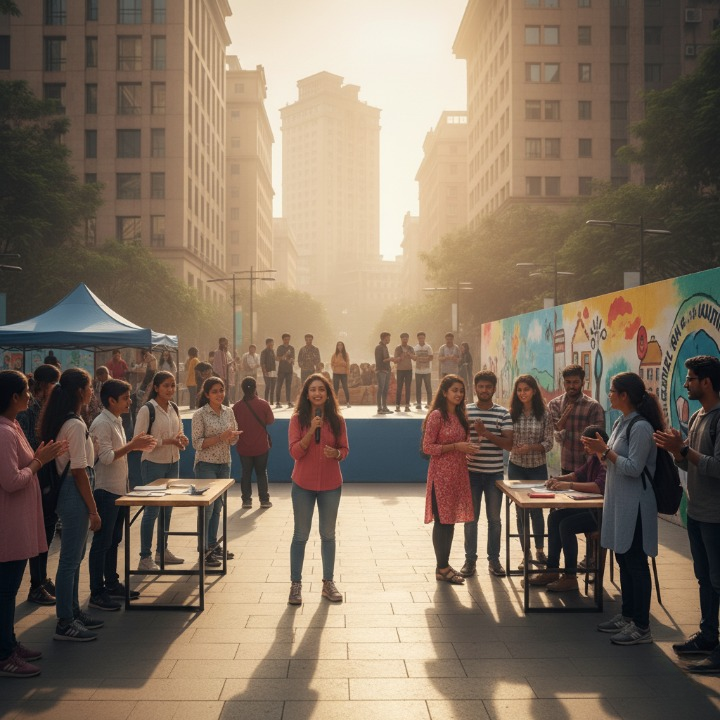Exploring the transformative power of young voices in shaping democratic futures.
Introduction
Youth political participation is a vital force that can redefine governance and societal progress. With over 65% of India’s population under the age of 35, young people have the potential to be the architects of the nation’s future. Their involvement in politics—whether as voters, campaigners, or leaders—creates a ripple effect, influencing not just policy-making but also the broader social and economic landscape. This article examines the far-reaching impacts of youth political engagement on society.
Youth Participation: A Catalyst for Change
1. Revitalizing Democracy
Young voters and leaders inject energy and fresh perspectives into democratic systems, making them more representative and dynamic.
- Example:
- The high turnout of young voters in the 2014 and 2019 General Elections demonstrated their ability to influence political outcomes.
(Source: Election Commission of India)
- Impact:
- By prioritizing issues like climate change, education reform, and digital inclusion, youth challenge traditional political narratives and drive progressive policies.
2. Promoting Accountability and Transparency
Young people are often at the forefront of demanding ethical governance and transparency, keeping political systems in check.
- Example:
- Youth-led movements such as India Against Corruption showcased the power of collective activism in influencing national discourse and legislative reforms.
The Social Impact of Youth Political Participation
1. Encouraging Civic Engagement
When young individuals engage in politics, they inspire their peers and communities to participate in civic activities, fostering a culture of involvement.
- Ripple Effect:
- Increased voter turnout.
- Enhanced community discussions on pressing issues like unemployment and gender equality.
2. Bridging Generational Gaps
Young leaders often act as intermediaries between older and younger generations, ensuring that policies cater to diverse age groups.
- Example:
- Leaders like Chandrani Murmu, India’s youngest MP, represent the aspirations of young citizens while addressing the concerns of older constituents.
(Source: Lok Sabha Secretariat)
3. Driving Social Justice Movements
Youth participation amplifies marginalized voices and brings attention to social inequalities.
- Example:
- Movements for LGBTQ+ rights, women’s safety, and environmental conservation often gain momentum through youth-led initiatives.
(Source: Ministry of Social Justice and Empowerment)
Economic Ripple Effects
1. Focus on Employment and Skill Development
Youth leaders prioritize job creation and skill development, addressing critical concerns for their generation.
- Policy Influence:
- Initiatives like Skill India Mission and Stand Up India emerged in response to youth-driven advocacy for economic empowerment.
(Source: Ministry of Skill Development)
2. Fostering Entrepreneurship
Political engagement by young individuals often leads to a greater emphasis on entrepreneurship and innovation, creating economic opportunities for communities.
Challenges to Youth Political Participation
1. Structural Barriers
High entry costs, lack of political connections, and systemic biases often discourage young people from entering politics.
2. Disillusionment
A perception of politics as corrupt or ineffective prevents many young individuals from participating actively.
(Source: National Youth Policy)
Strategies to Enhance Youth Participation
1. Education and Awareness
Incorporating political literacy in school curricula can empower young people with the knowledge to navigate political systems effectively.
2. Digital Engagement
Social media and digital platforms can mobilize young voters and amplify their voices in governance.
- Example:
- Platforms like MyGov allow youth to contribute ideas and participate in policy-making.
(Source: MyGov India)
Opinionated Yet Balanced Perspective
Youth political participation is not just a moral imperative but a strategic necessity for societal progress. By engaging in politics, young people can redefine governance, address long-standing inequities, and inspire collective action. However, overcoming barriers like systemic inequities and disillusionment requires sustained efforts from political institutions, educators, and civil society.
Conclusion
The ripple effect of youth political participation goes far beyond elections, influencing every facet of society, from governance to social justice and economic growth. By harnessing the energy and vision of young people, India can ensure a more inclusive, equitable, and progressive future. Encouraging youth to take active roles in politics is not just about shaping their lives—it’s about shaping the destiny of the nation.


Leave a Reply